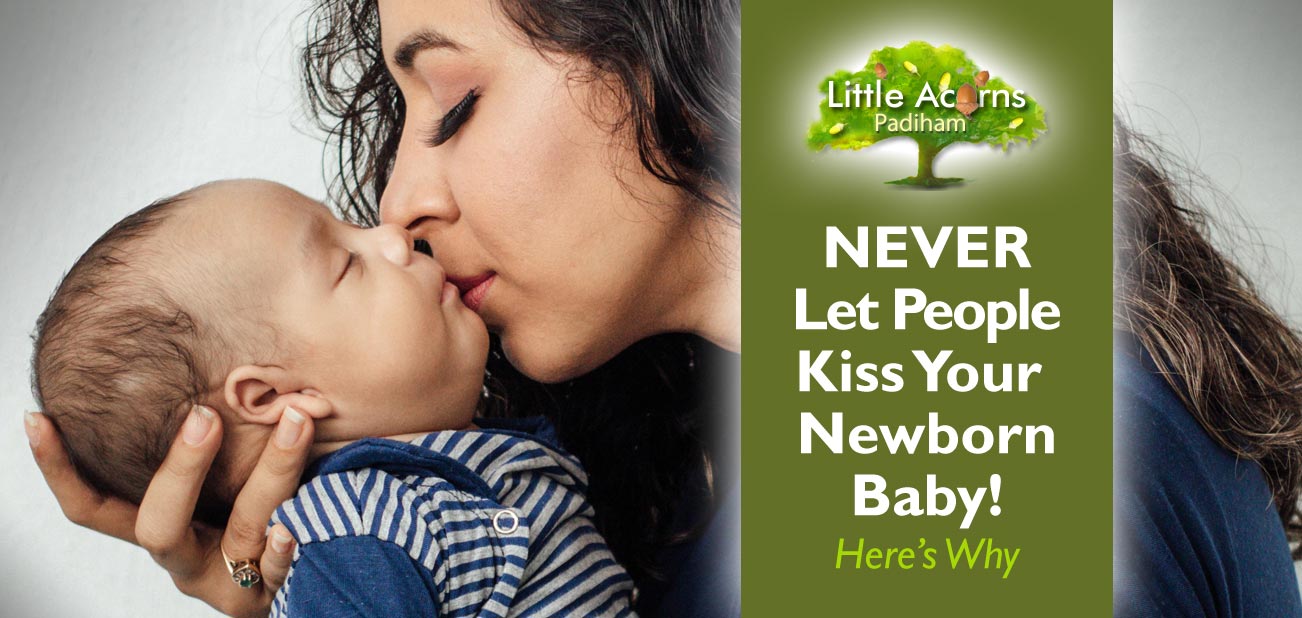
Did you know that kisses can potentially kill young babies in some circumstances? Sadly, many new parents are simply unaware of the dangers that such a loving and innocent act can potentially have on the well-being of their infant. It’s due to the immaturity of a newborn baby’s immune system and how that puts them at risk of contracting potentially catastrophic infections. These are infections that would usually cause only mild symptoms in older children and adults, but may cause potentially devastating harm to infants. One particular worry for newborns and those in the first few weeks of life comes from being kissed by a friend or relative who has a specific virus. Worryingly, it’s a virus which most adults carry. What’s more, many adults do not even realise they carry the virus. However, if a newborn baby catches it, it can be deadly. Today, we explain more about the risks associated with kissing babies and why it’s best not to let friends and relatives kiss a recently-born infant.
“The younger the baby, the more vulnerable they are to the harmful effects of infection.” — NHS.
Why are Young Babies So Vulnerable?
Kisses are dangerous to young babies because their immune systems are still immature and, during the first 4 months of life, something called the Blood-Brain Barrier (‘BBB’) is not yet fully optimised. This, in particular, leaves the baby’s brain vulnerable. The BBB is a semi-permeable membrane that serves several purposes. These include allowing oxygen and nutrients into the brain whilst also protecting it from harmful things like microbes, viruses, diseases, impurities, and toxic substances. During infancy, the Blood-Brain Barrier has simply not fully developed and ‘tightened’ enough to keep out all those harmful things, leaving the baby’s brain potentially exposed to them. That’s why babies are at greater risk of severe harm during their first few weeks and months — a time that’s also incredibly important for their developing brain.

Image (cropped detail) by Giovanna De Chiara, Maria Elena Marcocci, Rossella Sgarbanti, Livia Civitelli, Cristian Ripoli, Roberto Piacentini, Enrico Garaci, Claudio Grassi, Anna Teresa Palamara – CC BY 2.5
When Are Babies Most Susceptible to the Dangers Associated With Being Kissed?
Babies and young infants are most susceptible to the dangers associated with being kissed when they are in the first few weeks of life. The dangers of an infection reaching the brain and causing potentially catastrophic harm are at their worst during a baby’s first 4 months.
Why are Kisses So Potentially Harmful to Young Babies?
Kisses from friends, relatives, and even parents are potentially harmful to young infants because the immature Blood-Brain Barrier may allow an infection to pass to the baby and develop in the infant’s brain. Such an infection could lead to swelling, inflammation, and irreversible damage to the brain itself. Such afflictions are serious and can cause seizures, epilepsy, unconsciousness, strokes and even death.
“A baby is most at risk of getting a herpes infection in the first 4 weeks after birth.” — NHS.
One of the most worrisome infections that could be passed to an infant baby is the Neonatal Herpes Simplex Virus (HSV), also known as Neonatal Herpes and Neonatal HSV. This can be passed on to babies, via a simple kiss to the head, by a person who carries the herpes simplex virus. Perhaps surprisingly, it’s a very common virus that a person may not even know they have. Indeed, most adults carry the HSV-1 variant, usually associated with cold sores. Others carry the HSV-2 variant, which causes genital herpes. Blistering cold sores are a particular risk as they are a clear indication of an active and highly contagious infection — and one that can be easily passed to an infant via a touch or kiss, especially if given to the baby’s head.
“70% of the UK population carry one or two forms of this virus, but many of those people have no idea they are carriers as they have no symptoms at all.” — The Kit Tarka Foundation.
Precautions to Help Protect Your Baby
There are several precautions that parents and carers can take to protect babies from infections while they’re especially young and vulnerable. These include the following:
- Explaining the risks to friends and family and…
- Asking them (and anyone else) to avoid kissing your baby, especially on the head and face.
- Parents should also avoid kissing young babies when the adult is unwell, has recently been unwell, or has had a recent infection.
- Ensure people’s hands are washed thoroughly with soap before touching young babies.
- Active cold sores and lesions associated with the herpes virus should always be covered when a baby is close by. That also applies to breastfeeding mothers who should cover active lesions, including any on the breasts.
The Lullaby Trust suggests that people follow the THANKS approach, which is an acronym for Think Hands And No KisseS.
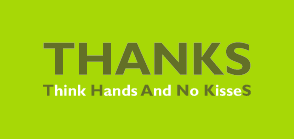
Overcome Awkwardness!
Ask Friends & Relatives Not to Touch Your Baby
Asking friends and family not to kiss your young baby can be awkward, but it’s important to do so. According to the Kit Tarka Foundation, as many as 8,500 babies die from neonatal herpes around the world each year. A 2013 Nottingham study estimates that as many as 1 baby per week dies in the UK because of it, although more up-to-date studies are needed.
More Information
Click here for more information about Neonatal Herpes, including its causes, how it’s transmitted, preventative measures to protect babies, how to spot possible symptoms, treatments, and more.
Little Acorns Nursery, Padiham
The Best Start for Babies, Toddlers, & Preschoolers
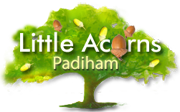
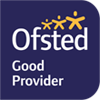 We hope that our blog post today and all those in our Journal area are useful for parents. We publish every month, so please bookmark the Journal page and visit regularly to see more.
We hope that our blog post today and all those in our Journal area are useful for parents. We publish every month, so please bookmark the Journal page and visit regularly to see more.
Little Acorns is a high-quality nursery in Padiham and is rated as a Good Provider by Ofsted. We offer a first-class childcare service for babies, toddlers, and under-fives on weekdays throughout the year. It’s a lovely, warm, caring environment where every child feels valued, loved, well cared for and nurtured. At Little Acorns, we bring out the best in every child so they are ready to thrive as they approach school age.
Contact us today to explore the possibility of your child attending Little Acorns Nursery, Padiham:
Based in Padiham, near Burnley, Little Acorns Nursery may also suit other Lancashire families in nearby towns and villages like Hapton, Rose Grove, Altham, Huncoat, Read, Simonstone, Sabden, Higham and Wood End.
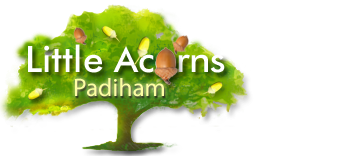
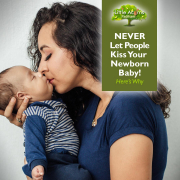
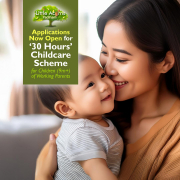
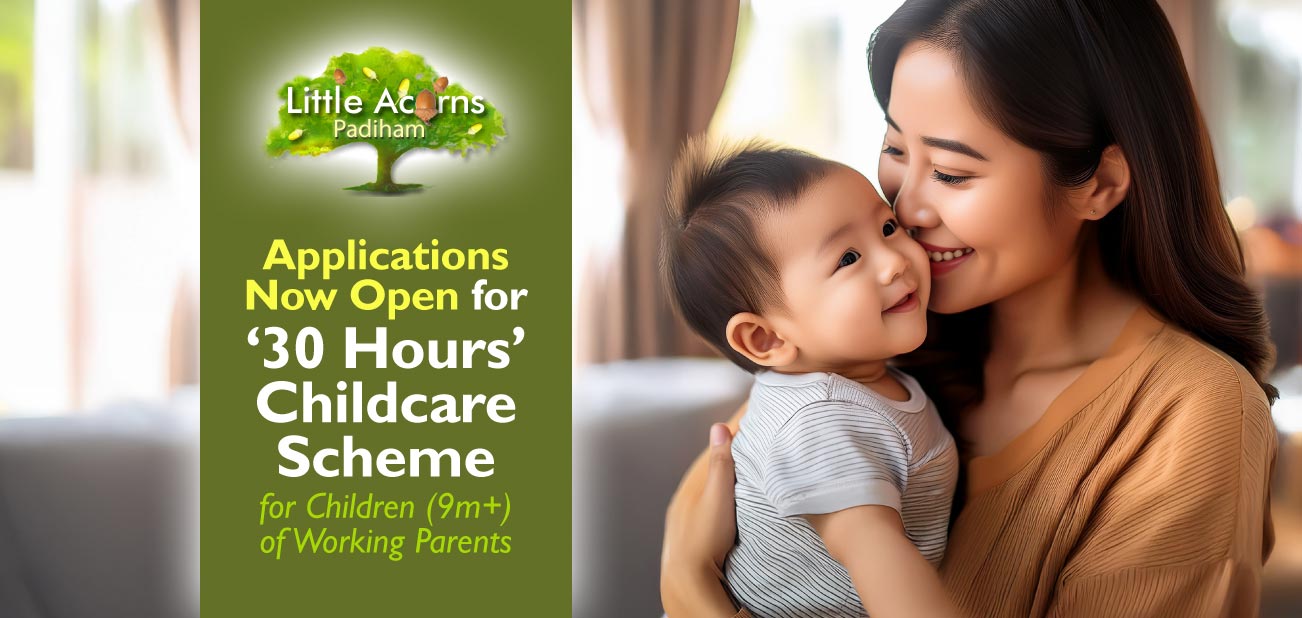
 Attention working families: applications are now open for eligible children, aged from only 9 months, to receive 1140 hours of free childcare per year from September 2025. What’s noteworthy is that this will be the first time such young infants and toddlers can access so many free hours. It effectively doubles the number of free childcare hours previously available to those under 2 via the scheme. The new, extended funding is for eligible working families, who now have until the 31st of August to apply if they would like their child(ren) to start in the September 2025 term.
Attention working families: applications are now open for eligible children, aged from only 9 months, to receive 1140 hours of free childcare per year from September 2025. What’s noteworthy is that this will be the first time such young infants and toddlers can access so many free hours. It effectively doubles the number of free childcare hours previously available to those under 2 via the scheme. The new, extended funding is for eligible working families, who now have until the 31st of August to apply if they would like their child(ren) to start in the September 2025 term.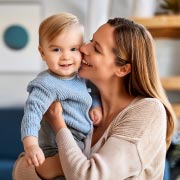 This newly extended scheme will be profoundly beneficial to parents, children, the business world, and the economy. Let’s take a look:
This newly extended scheme will be profoundly beneficial to parents, children, the business world, and the economy. Let’s take a look: The funded childcare is for children of working parents with earnings within the specific range outlined below. Under this scheme, children receiving the free hours from the September 2025 term must be aged no less than 9 months old on 1st September 2025 and free funding for those who remain eligible is available right up until school age.
The funded childcare is for children of working parents with earnings within the specific range outlined below. Under this scheme, children receiving the free hours from the September 2025 term must be aged no less than 9 months old on 1st September 2025 and free funding for those who remain eligible is available right up until school age. As our families regularly confirm, Little Acorns in Padiham is a highly-regarded childcare nursery that attracts
As our families regularly confirm, Little Acorns in Padiham is a highly-regarded childcare nursery that attracts 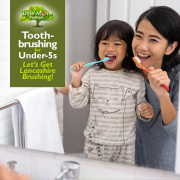
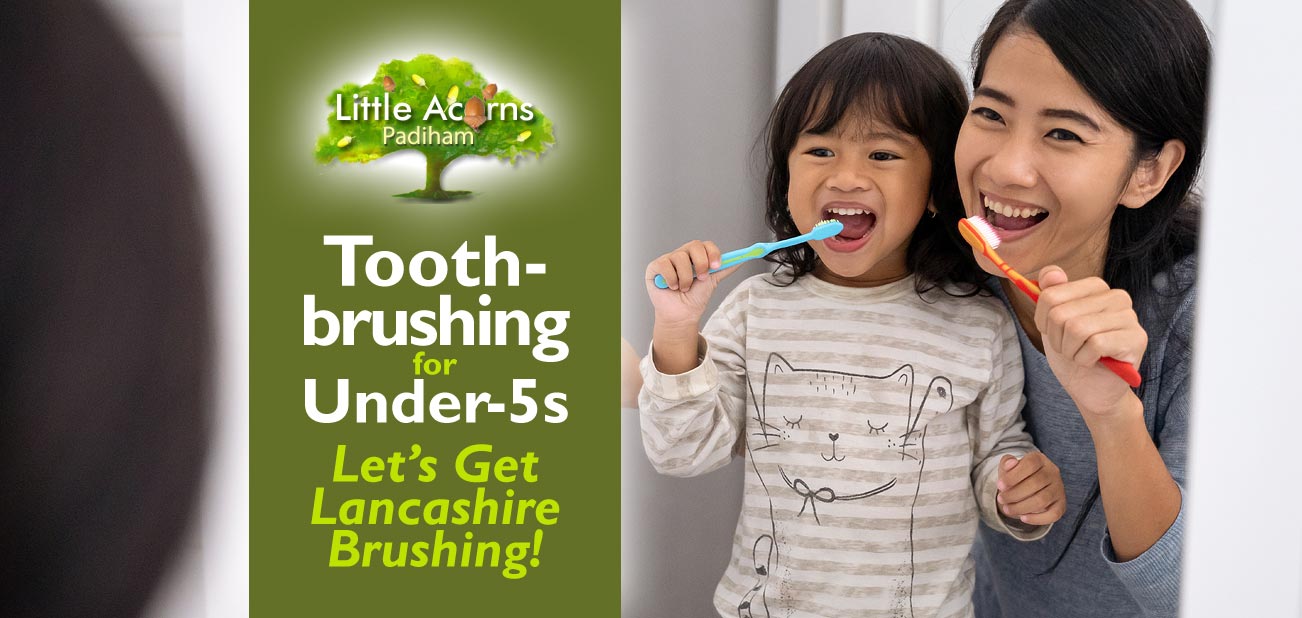
 Today we bring you a guide to toothbrushing for under-fives, inspired by children at Little Acorns Nursery taking part in Lancashire’s Let’s Get Lancashire Brushing campaign. An initiative of Lancashire County Council Public Health, the programme is designed to educate and encourage young children, including toddlers, to brush teeth for 2 minutes twice a day using age-appropriate toothpaste. What’s more, their message is that it’s never too young to begin and can even start before the first tooth has surfaced. At Little Acorns Nursery, the programme is supervised by staff and is intended to take place in tandem with toothbrushing at home — it does not replace it. Nursery staff guide children to establish a positive and proactive routine around toothbrushing, to foster good habits around oral hygiene, and thereby minimise tooth decay and problems associated with it.
Today we bring you a guide to toothbrushing for under-fives, inspired by children at Little Acorns Nursery taking part in Lancashire’s Let’s Get Lancashire Brushing campaign. An initiative of Lancashire County Council Public Health, the programme is designed to educate and encourage young children, including toddlers, to brush teeth for 2 minutes twice a day using age-appropriate toothpaste. What’s more, their message is that it’s never too young to begin and can even start before the first tooth has surfaced. At Little Acorns Nursery, the programme is supervised by staff and is intended to take place in tandem with toothbrushing at home — it does not replace it. Nursery staff guide children to establish a positive and proactive routine around toothbrushing, to foster good habits around oral hygiene, and thereby minimise tooth decay and problems associated with it.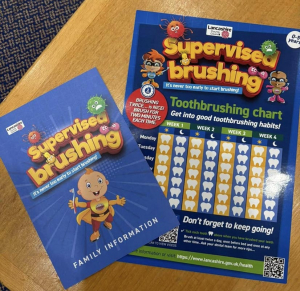
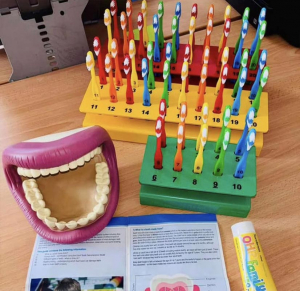
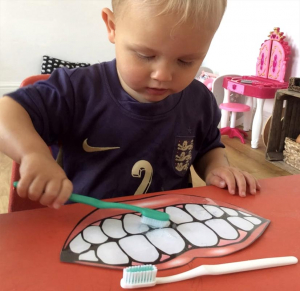
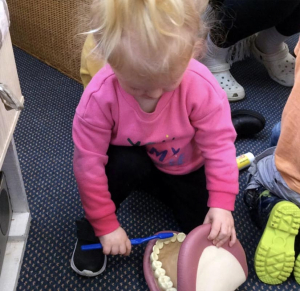

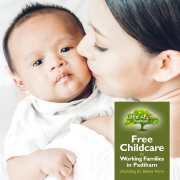
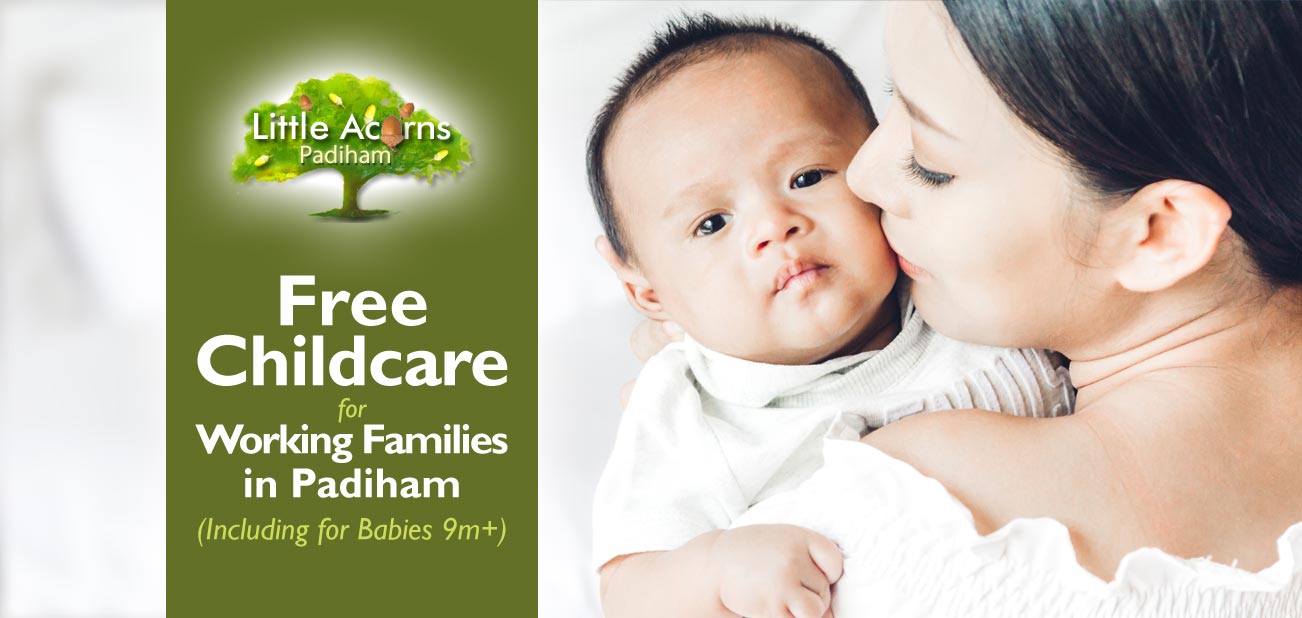
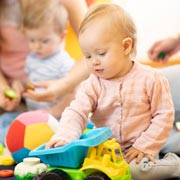 Today, we remind Padiham families that Little Acorns Nursery supports the new — free — childcare scheme for eligible children including babies as young as just 9 months of age. Although it’s available only to eligible working families, the bar to entry is fairly low. The childcare funding is therefore attainable for many families. This free childcare is not just limited to babies either and, what’s more, it’s due to become even more generous from September 2025. In our guide below we’ll outline who is eligible, how much childcare funding they can access, how many childcare hours that equates to, and what the eligibility criteria are. If you’re the parent of a baby, toddler, or child up to three years old, this is for you.
Today, we remind Padiham families that Little Acorns Nursery supports the new — free — childcare scheme for eligible children including babies as young as just 9 months of age. Although it’s available only to eligible working families, the bar to entry is fairly low. The childcare funding is therefore attainable for many families. This free childcare is not just limited to babies either and, what’s more, it’s due to become even more generous from September 2025. In our guide below we’ll outline who is eligible, how much childcare funding they can access, how many childcare hours that equates to, and what the eligibility criteria are. If you’re the parent of a baby, toddler, or child up to three years old, this is for you.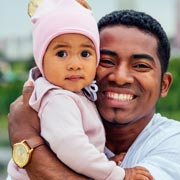 For those working families who are eligible, the scheme provides 570 hours per year of free childcare to children aged from 9 months to 3 years. This is normally taken as 15 hours per week for 38 weeks, usually aligning with the standard educational term-time weeks for school timetables. That said, it may be possible to stretch the hours over more weeks of the year if your childcare provider is able to accommodate such flexibility.
For those working families who are eligible, the scheme provides 570 hours per year of free childcare to children aged from 9 months to 3 years. This is normally taken as 15 hours per week for 38 weeks, usually aligning with the standard educational term-time weeks for school timetables. That said, it may be possible to stretch the hours over more weeks of the year if your childcare provider is able to accommodate such flexibility. We’ll try to simplify the eligibility criteria for you. Whether it’s for a baby aged 9 months, a toddler of 1 or 2, or a child aged 3 or 4, there are essentially four main criteria for this specific type of childcare funding:
We’ll try to simplify the eligibility criteria for you. Whether it’s for a baby aged 9 months, a toddler of 1 or 2, or a child aged 3 or 4, there are essentially four main criteria for this specific type of childcare funding: Well, it’s good news. It’s already the case that all 3 and 4-year-olds living in England are eligible to receive 570 hours (15 per week) of free childcare anyway. That’s available under what’s known as ‘Universal Entitlement’, a Government childcare funding scheme that’s been around for some time. What’s more, those working families that are eligible for the ‘new’ free childcare for children aged 9 months to 3 years are also likely to be eligible for a top-up of their child’s Universal Entitlement once they reach the ages of 3 and 4. In those cases, they’ll be entitled to 30 hours per week over 38 weeks (or however the 1140 free hours are spread out). That’s because the eligibility criteria are the same (see section above).
Well, it’s good news. It’s already the case that all 3 and 4-year-olds living in England are eligible to receive 570 hours (15 per week) of free childcare anyway. That’s available under what’s known as ‘Universal Entitlement’, a Government childcare funding scheme that’s been around for some time. What’s more, those working families that are eligible for the ‘new’ free childcare for children aged 9 months to 3 years are also likely to be eligible for a top-up of their child’s Universal Entitlement once they reach the ages of 3 and 4. In those cases, they’ll be entitled to 30 hours per week over 38 weeks (or however the 1140 free hours are spread out). That’s because the eligibility criteria are the same (see section above).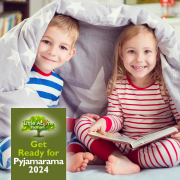
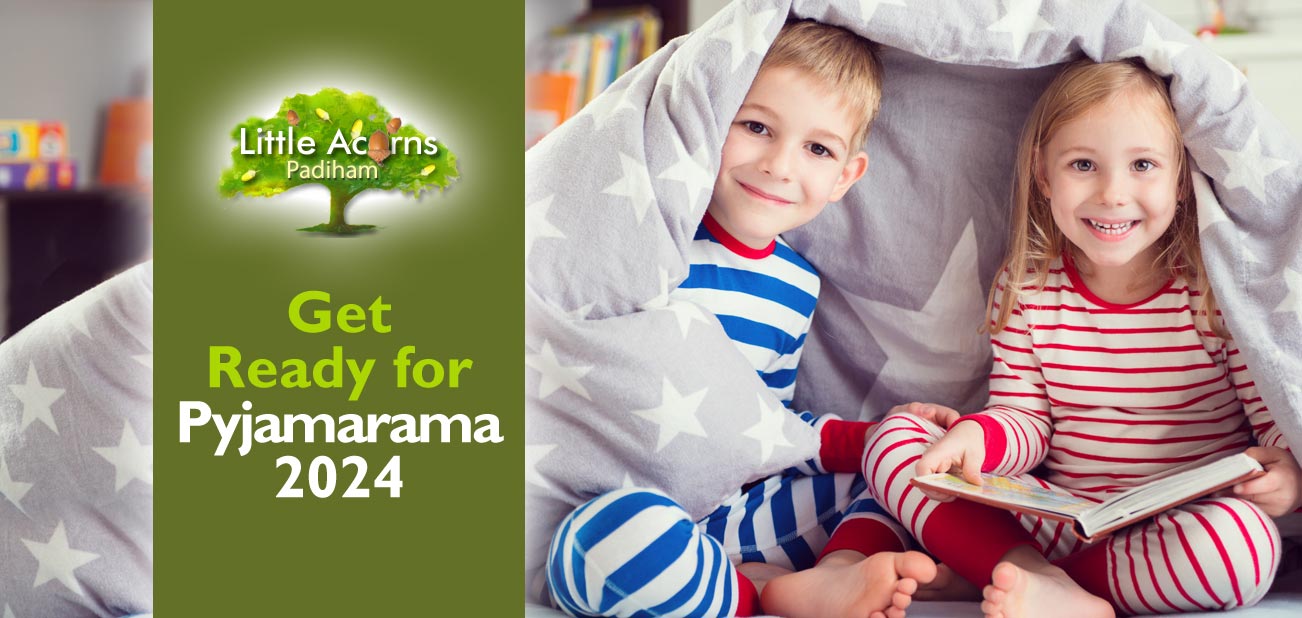
 Pyjamarama is a one-day fundraising event that’s organised through the children’s reading charity BookTrust. It takes place each year across a variety of UK settings including homes, schools, preschools, nurseries and more. As well as being great fun for those organising and taking part, the initiative is beneficial to millions of disadvantaged children. The ultimate aim is to raise money to fund the purchase of books and resources, so that every child in the UK gets the chance for bedtime stories and each family has proper reading opportunities. The initiative is hugely popular, great fun, and transforms lives. Today, we take a look at what to expect, how to get involved, and the many benefits of Pyjamarama.
Pyjamarama is a one-day fundraising event that’s organised through the children’s reading charity BookTrust. It takes place each year across a variety of UK settings including homes, schools, preschools, nurseries and more. As well as being great fun for those organising and taking part, the initiative is beneficial to millions of disadvantaged children. The ultimate aim is to raise money to fund the purchase of books and resources, so that every child in the UK gets the chance for bedtime stories and each family has proper reading opportunities. The initiative is hugely popular, great fun, and transforms lives. Today, we take a look at what to expect, how to get involved, and the many benefits of Pyjamarama.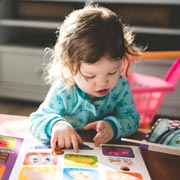 Pyjamarama is always a fun day for both adults and children. The added aspect of pyjamas makes it special, quirky and relaxed. And, at the end of the day, it’s incredibly worthwhile. Not only does it raise money to give disadvantaged children and their families opportunities for reading and bedtime stories, but it also encourages those children taking part in Pyjamarama to read more, for pleasure as much as anything. Additionally, it gives children a different perspective and encourages altruism and empathy for others less fortunate than themselves.
Pyjamarama is always a fun day for both adults and children. The added aspect of pyjamas makes it special, quirky and relaxed. And, at the end of the day, it’s incredibly worthwhile. Not only does it raise money to give disadvantaged children and their families opportunities for reading and bedtime stories, but it also encourages those children taking part in Pyjamarama to read more, for pleasure as much as anything. Additionally, it gives children a different perspective and encourages altruism and empathy for others less fortunate than themselves.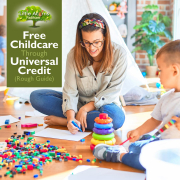
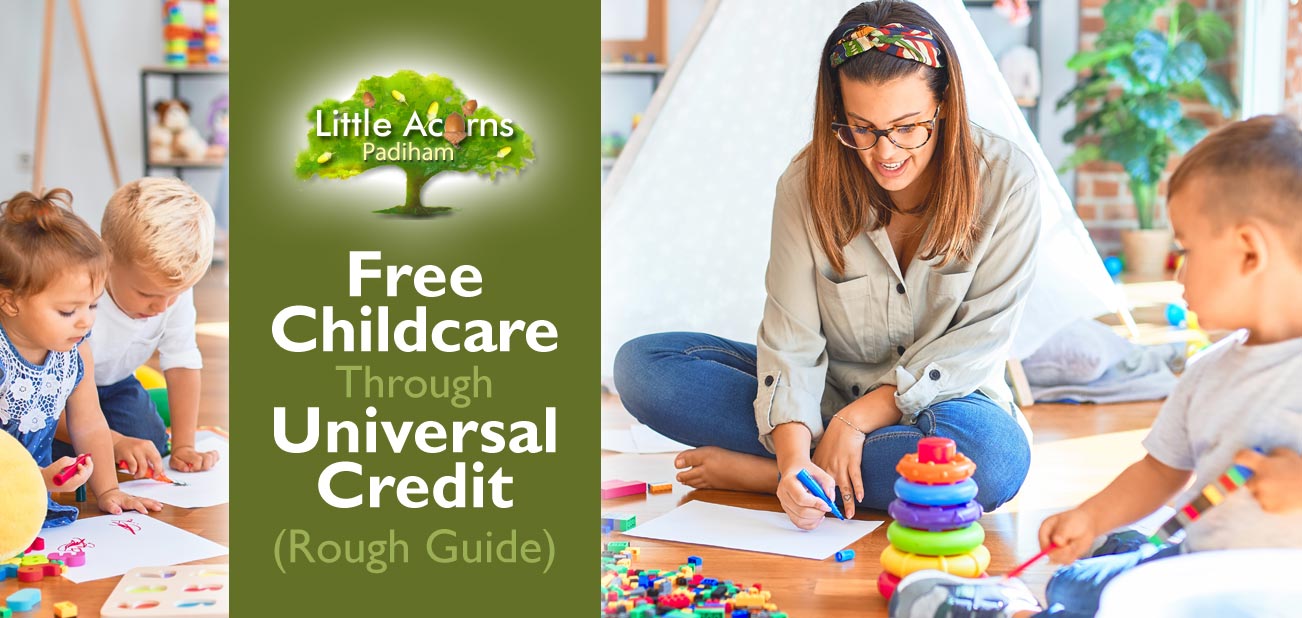
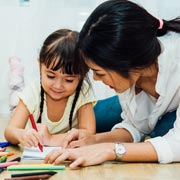 Usually, you will need to pay for childcare costs first and then reclaim them through your Universal Credit childcare support account. However, there are some circumstances where you may be able to get some of your childcare costs paid upfront through the scheme. This recent change is designed to help families essentially with cash flow so that a major barrier to working is removed. That, in turn, will also help the economy.
Usually, you will need to pay for childcare costs first and then reclaim them through your Universal Credit childcare support account. However, there are some circumstances where you may be able to get some of your childcare costs paid upfront through the scheme. This recent change is designed to help families essentially with cash flow so that a major barrier to working is removed. That, in turn, will also help the economy.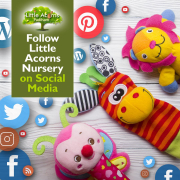
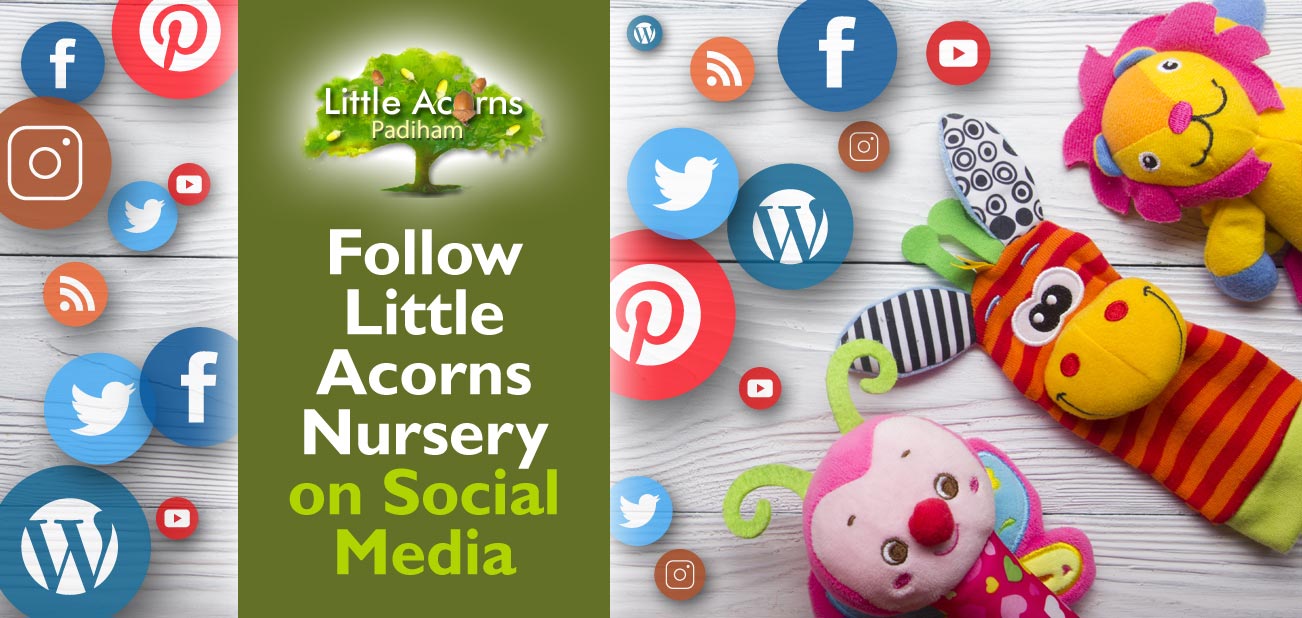
 This is what we call our blog (short for ‘web log’) where we regularly publish guides and useful information for parents of children under five.
This is what we call our blog (short for ‘web log’) where we regularly publish guides and useful information for parents of children under five.  We’re @NurseryPadiham on Twitter, so you can follow us at
We’re @NurseryPadiham on Twitter, so you can follow us at  We’re @TotsNursery on Facebook (because we took over the Adventure Tots childcare business), so you can follow us at
We’re @TotsNursery on Facebook (because we took over the Adventure Tots childcare business), so you can follow us at  We’re @LittleAcornsNurseryBB12 on Instagram, so you can follow us at
We’re @LittleAcornsNurseryBB12 on Instagram, so you can follow us at  We’re also @LittleAcornsNurseryBB12 on Pinterest, so you can follow our pins and boards at
We’re also @LittleAcornsNurseryBB12 on Pinterest, so you can follow our pins and boards at  We appreciate that, if you’re reading this, you’ve already found us. However, if you ever need to find us again and aren’t sure where to look, we’re also on Google.
We appreciate that, if you’re reading this, you’ve already found us. However, if you ever need to find us again and aren’t sure where to look, we’re also on Google. 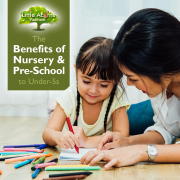
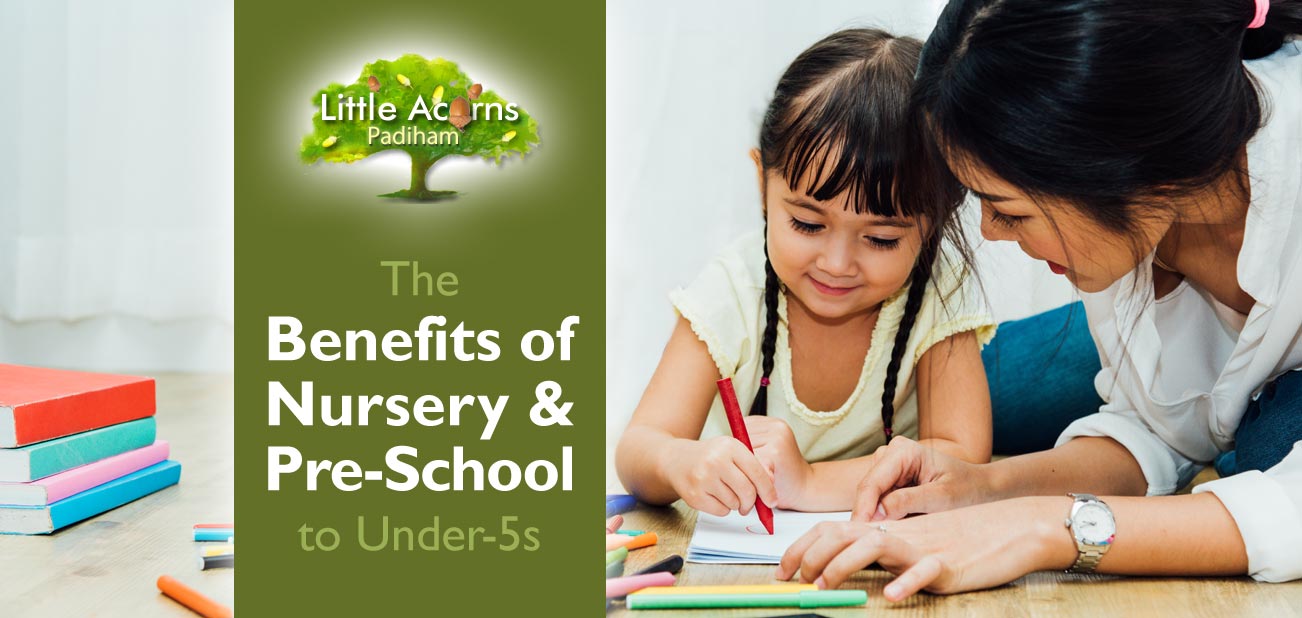
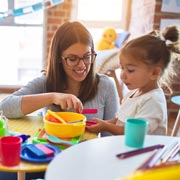 A good nursery or pre-school is so much more than just a crèche, playgroup, kindergarten or childminding service.
A good nursery or pre-school is so much more than just a crèche, playgroup, kindergarten or childminding service. 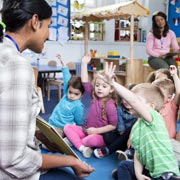 Nurseries like Little Acorns in Padiham provide a dynamic environment where children mostly learn through different types of play and pre-planned, carefully structured activities. Much of their learning is achieved through the application of the
Nurseries like Little Acorns in Padiham provide a dynamic environment where children mostly learn through different types of play and pre-planned, carefully structured activities. Much of their learning is achieved through the application of the 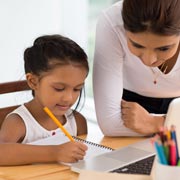 A good early years childcare provider like Little Acorns will also nurture every aspect of children’s personal development. Research suggests that starting childcare and a good early years education at a young age can have significant positive effects on children’s development.
A good early years childcare provider like Little Acorns will also nurture every aspect of children’s personal development. Research suggests that starting childcare and a good early years education at a young age can have significant positive effects on children’s development. Spending time at nursery and pre-school provides children with countless opportunities to interact with peers and to learn to socialise with others. Through doing so, they’ll develop their social skills generally, including things like learning good manners, needing to sometimes share or take turns, learning about mutual respect, and following rules.
Spending time at nursery and pre-school provides children with countless opportunities to interact with peers and to learn to socialise with others. Through doing so, they’ll develop their social skills generally, including things like learning good manners, needing to sometimes share or take turns, learning about mutual respect, and following rules.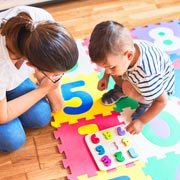 Good nurseries and pre-schools like Little Acorns welcome and support children of all abilities. As part of this and whenever possible, they will create an inclusive environment for children with special educational needs or disabilities (SEND). They’ll support them in every way they can including, where possible, provision of special equipment, adapting the environment to make it more accessible, and obtaining additional funding for extra resources. They’ll even work with outside professionals, where appropriate, to develop the best ‘joined-up’ plan to support children. The result is a positive and responsive culture where children feel comfortable and valued, irrespective of ability or disability.
Good nurseries and pre-schools like Little Acorns welcome and support children of all abilities. As part of this and whenever possible, they will create an inclusive environment for children with special educational needs or disabilities (SEND). They’ll support them in every way they can including, where possible, provision of special equipment, adapting the environment to make it more accessible, and obtaining additional funding for extra resources. They’ll even work with outside professionals, where appropriate, to develop the best ‘joined-up’ plan to support children. The result is a positive and responsive culture where children feel comfortable and valued, irrespective of ability or disability.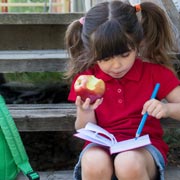 All of the above will really help children to develop the skills and confidence they need to absolutely thrive once they start at primary school. As well as being more able and literate from the moment they start, they’ll more easily be able to follow routines, listen to instructions, and work independently. They’ll absolutely hit the ground running with the existing knowledge, tools and abilities that they learned during their all-important early years. Indeed, those children who receive a high quality early years education have been shown to attain higher grades in their GCSEs and can be the equivalent of a year ahead by the time they reach the age of 15.
All of the above will really help children to develop the skills and confidence they need to absolutely thrive once they start at primary school. As well as being more able and literate from the moment they start, they’ll more easily be able to follow routines, listen to instructions, and work independently. They’ll absolutely hit the ground running with the existing knowledge, tools and abilities that they learned during their all-important early years. Indeed, those children who receive a high quality early years education have been shown to attain higher grades in their GCSEs and can be the equivalent of a year ahead by the time they reach the age of 15.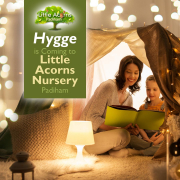
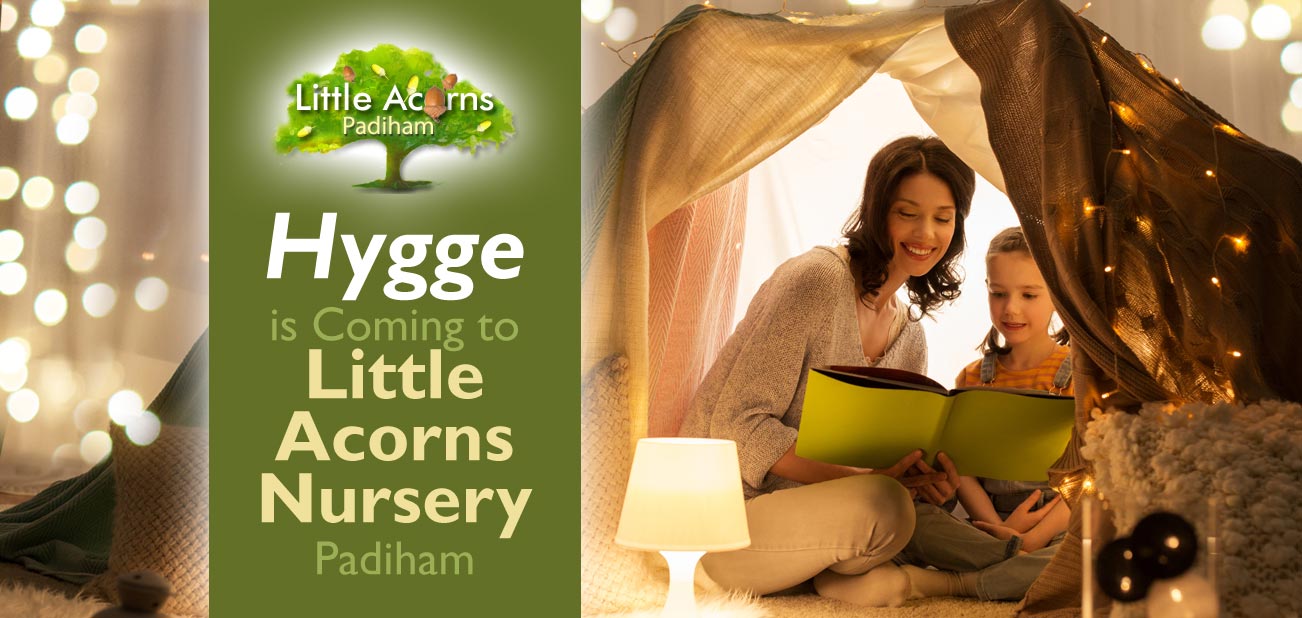
 One of the exciting new initiatives that we have planned for Little Acorns nursery, Padiham, is to make it a Hygge setting. In today’s post, we explain what Hygge means and how it will benefit the setting, especially the children. Once the Hygge initiative has been fully adopted, it will positively transform the whole feel of the nursery and benefit everyone. Introducing Hygge is exciting and the children are going to love it! To be truthful, we can’t wait to get started!
One of the exciting new initiatives that we have planned for Little Acorns nursery, Padiham, is to make it a Hygge setting. In today’s post, we explain what Hygge means and how it will benefit the setting, especially the children. Once the Hygge initiative has been fully adopted, it will positively transform the whole feel of the nursery and benefit everyone. Introducing Hygge is exciting and the children are going to love it! To be truthful, we can’t wait to get started! Counter to the instincts of those whose first language is English, Hygge is pronounced “Hue-Gah” rather than “Hig”. It is popular in Denmark and Norway and is a Danish word that refers to a rather beautiful lifestyle; one of cosiness, homeliness, contentment and comfort. Wellbeing, warmth and conviviality are central to the Hygge approach. Friendliness, a welcoming atmosphere and closer links to nature are key parts of the Hygge way of life too. Having a more simple lifestyle and living far more in the moment are also part and parcel of Hygge. With such facets, Hygge naturally fosters happiness and contentment in everyone that it touches. Indeed, that’s one of the many reasons we can’t wait for both children and staff to start embracing it at Little Acorns Nursery.
Counter to the instincts of those whose first language is English, Hygge is pronounced “Hue-Gah” rather than “Hig”. It is popular in Denmark and Norway and is a Danish word that refers to a rather beautiful lifestyle; one of cosiness, homeliness, contentment and comfort. Wellbeing, warmth and conviviality are central to the Hygge approach. Friendliness, a welcoming atmosphere and closer links to nature are key parts of the Hygge way of life too. Having a more simple lifestyle and living far more in the moment are also part and parcel of Hygge. With such facets, Hygge naturally fosters happiness and contentment in everyone that it touches. Indeed, that’s one of the many reasons we can’t wait for both children and staff to start embracing it at Little Acorns Nursery.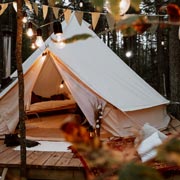 Once we’ve adopted Hygge at the nursery, it’ll look and feel warmer and far more welcoming, with softer, warmer lighting and a more homely atmosphere. Gone will be anything that looks sterile, cold or even harshly lit. Instead, expect to see soft furnishings including cushions, rugs and blankets. Look out for little nooks where children can gather in small groups to read, play or engage with each other or with staff. Hygge nurseries are also synonymous with dens and teepees, allowing children to ‘nest’ in calm, cosy spaces and corners. All these things will also deaden sound, reduce noise levels, and banish echoes, making for a much calmer setting entirely.
Once we’ve adopted Hygge at the nursery, it’ll look and feel warmer and far more welcoming, with softer, warmer lighting and a more homely atmosphere. Gone will be anything that looks sterile, cold or even harshly lit. Instead, expect to see soft furnishings including cushions, rugs and blankets. Look out for little nooks where children can gather in small groups to read, play or engage with each other or with staff. Hygge nurseries are also synonymous with dens and teepees, allowing children to ‘nest’ in calm, cosy spaces and corners. All these things will also deaden sound, reduce noise levels, and banish echoes, making for a much calmer setting entirely. We mentioned that Hygge brings people closer to nature and that will be evident not only outside but indoors too. We’ll ensure there are natural objects and materials for the children to explore and handle, including things like smooth pebbles, wood surfaces, pine cones and perhaps reed and wicker items. These will be lovely to handle and to be around, stimulating multiple senses, which is so important in the young. The introduction of appropriate plants will also
We mentioned that Hygge brings people closer to nature and that will be evident not only outside but indoors too. We’ll ensure there are natural objects and materials for the children to explore and handle, including things like smooth pebbles, wood surfaces, pine cones and perhaps reed and wicker items. These will be lovely to handle and to be around, stimulating multiple senses, which is so important in the young. The introduction of appropriate plants will also  Children will also be encouraged to be convivial, i.e. be friendly, inclusive, pleasant and welcoming to one another and to staff. We always try to foster a culture of mutual respect and equality, but the introduction of Hygge to the nursery will take this even further. Sharing and politeness are to be encouraged. Play will be calmer and more harmonious. With Hygge, growing friendships will naturally blossom. Hygge minimises conflict and leads to harmony, calmness and a very pleasurable day-to-day experience for everyone touched by it.
Children will also be encouraged to be convivial, i.e. be friendly, inclusive, pleasant and welcoming to one another and to staff. We always try to foster a culture of mutual respect and equality, but the introduction of Hygge to the nursery will take this even further. Sharing and politeness are to be encouraged. Play will be calmer and more harmonious. With Hygge, growing friendships will naturally blossom. Hygge minimises conflict and leads to harmony, calmness and a very pleasurable day-to-day experience for everyone touched by it.